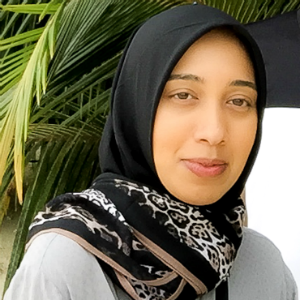 Career progression
Career progression
1. Pharmacology BSc
2. MRes
3. PhD
4. Postdoc
5. Academia (prospective)
Aisah is a postdoctoral researcher at the William Harvey Research Institute, Queen Mary University of London.
What is your career pathway to date (including your education)?
I completed my undergraduate degree in pharmacology at King’s College London in 2009, with a final year project working with sensory neurons in the lab of Dr Domenico Spina. I then embarked on a four year BBSRC PhD studentship, which consisted of an MRes in the first year (2010). During that time, I gained extensive in vivo training in integrative pharmacology and physiology in the lab of Professor Susan Brain, Dr Andy Grant and Dr Manasi Nandi. My PhD (2011-14) focused on understanding the role of the ion channel TRPA1 in the vasculature and we identified TRPA1 as a cold sensor in vivo. I was fascinated by sensory neurons and did my first postdoc with Professor Susan Brain where I studied the effects of a novel calcitonin gene-related peptide analogue provided by Novo Nordisk in experimental models of hypertension and heart failure. In 2016, I moved to Professor Adrian Hobbs’ lab at William Harvey Research Institute (WHRI), where I am now studying the role of C-type natriuretic peptide in angiogenesis and vascular remodeling in cardiovascular homeostasis and disease.
What do you do? What does a typical week look like to you?
I do not have a typical week but I spent most of my time at the bench side, with a mixture of in vitro and in vivo experiments. Over the past year, I have been setting up experimental models of cardiovascular disease at WHRI, and I am using various non-invasive imaging techniques to map the changes that take place in the vasculature. I also harvest cells from the lung to grow in culture so I can test the action of drugs. To fully understand how C-type natriuretic peptide works in the vasculature, my project focuses on using different pharmacological inhibitors and cell-specific transgenic mice, which is very exciting for any pharmacologist. I enjoy imaging and hence, I spend long hours in dark rooms, analysing microscopic images.
A lot of my time is spent on planning each day carefully to maximize output as we work collaboratively, sharing procedure rooms, equipment and tissue at the institute. I spend most of my evenings analysing my data, planning my experiments, preparing for presentations for lab meetings or conferences, writing or catching up with scientific literature.
As a Society ambassador, I am involved in various outreach/public engagement activities and provide support for the pharmacology undergraduate students at both Queen Mary University of London and King’s College London. I have recently joined the Society's Policy & Public Engagement Committee where I am working closely with the team to promote and advance pharmacology with the public and policy makers. As an Editorial Board member of Pharmacology Matters, I am often involved in writing and editing contents for the magazine.
Whilst I see my research more as a way of life rather than a job, I also make time for baking, crafting and gardening which I find very rewarding and sometimes this is when one often thinks of the great ideas.
What do you like and dislike the most about your current position?
I like the flexibility of being an academic postdoc. I was fortunate to be trained by Professor Susan Brain, who is an amazing pharmacologist and who introduced me to the world of vascular biology. At the moment, I am enthused to study the functions of blood vessels and the little wonders of C-type natriuretic peptide. I feel privileged to be mentored by Professor Adrian Hobbs and be part of a great research team. I thoroughly enjoy working on my two projects, which is allowing me to gain extensive training in cardiovascular pharmacology. The best feeling is one of those evenings when you draw a graph and it jumps out of your computer screen, you feel extremely happy and cannot go to sleep. For this feeling, I can spend ages at the benchside.
I dislike short funding contracts in academia but can help focus your research interests and explore funding opportunities.
How do you see your career further progressing in the future?
I am determined to establish myself as an independent scientist but I am just at the start of my journey. I am looking forward to using my acquired skills to explore all sorts of avenues that are intellectually stimulating in an academic career. It is a very competitive field and at the moment I do not have a plan B. I hope that one day the research I have done or contributed to will improve people’s lives.
What three pieces of advice would you give someone keen on developing a career in your area of work?
If you have a passion for science, like drug discovery and want to understand how drugs work, pharmacology is a fascinating undergraduate subject to study.
A four year PhD studentship with an MRes in the first year is very rewarding, especially if you did not take a year out in industry or had a summer studentship in your final year. Spending a few weeks/summer working in your mentor’s lab will help you choose the correct lab and/or area of interest. Anticipate disappointments – don’t be disheartened with negative results or failed experiments, and don’t be afraid to ask ‘simple and naïve’ questions!
Find what you are passionate about and stick with it! Network, collaborate and keep up-to-date with the scientific literature. Take every given opportunity to talk about your work and educate younger generations of scientists about pharmacology.
You can follow Aisah on twitter @Dr_A_Cubed.